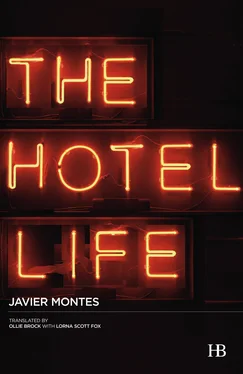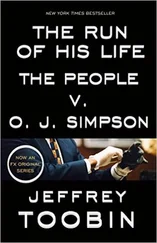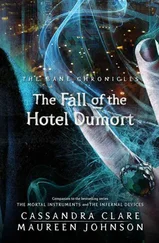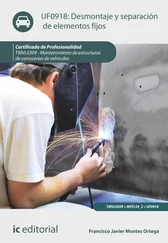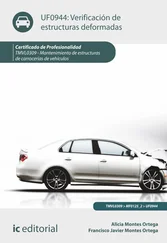Javier Montes - The Hotel Life
Здесь есть возможность читать онлайн «Javier Montes - The Hotel Life» весь текст электронной книги совершенно бесплатно (целиком полную версию без сокращений). В некоторых случаях можно слушать аудио, скачать через торрент в формате fb2 и присутствует краткое содержание. Год выпуска: 2013, Издательство: Hispabooks, Жанр: Современная проза, на английском языке. Описание произведения, (предисловие) а так же отзывы посетителей доступны на портале библиотеки ЛибКат.
- Название:The Hotel Life
- Автор:
- Издательство:Hispabooks
- Жанр:
- Год:2013
- ISBN:нет данных
- Рейтинг книги:3 / 5. Голосов: 1
-
Избранное:Добавить в избранное
- Отзывы:
-
Ваша оценка:
- 60
- 1
- 2
- 3
- 4
- 5
The Hotel Life: краткое содержание, описание и аннотация
Предлагаем к чтению аннотацию, описание, краткое содержание или предисловие (зависит от того, что написал сам автор книги «The Hotel Life»). Если вы не нашли необходимую информацию о книге — напишите в комментариях, мы постараемся отыскать её.
The Hotel Life — читать онлайн бесплатно полную книгу (весь текст) целиком
Ниже представлен текст книги, разбитый по страницам. Система сохранения места последней прочитанной страницы, позволяет с удобством читать онлайн бесплатно книгу «The Hotel Life», без необходимости каждый раз заново искать на чём Вы остановились. Поставьте закладку, и сможете в любой момент перейти на страницу, на которой закончили чтение.
Интервал:
Закладка:
He stood motionless. I backed away as far as the entrance to the enormous freezer, once more feeling the icy draft on the back of my neck. I don’t recall whether he was serious or smiling when he strode toward me. I was rooted to the spot. Instinctively, I raised an arm.
And through the fingers of my outstretched hand, barely a yard away, so that I could practically feel his breath on my face, I witnessed a strange, almost slapstick scene. I saw him stumble and lose his balance and take an almighty leap toward me, a flailing but not entirely graceless leap. The open corners of his jacket flapped as though helping to propel his flight, raining keys, coins, papers, and cigarettes in the air. Part of me cheered the precision, the unerring accuracy of that pirouette. I felt the delight of the child who discovers that sometimes, very occasionally, reality will try its hand at cartoon loops and ricochets.
I stepped sideways to dodge him. He didn’t so much as brush against me. I only grasped how powerful a force was concealed in the inertia of that stumble that looked so comically fake when, after an eternal second of unsightly windmilling, old Pedro landed with a loud, painful-sounding crash on the floor of the refrigeration chamber.
He lay prone and pensive, then moved a tentative hand like a blind man making sure the way is clear before taking the next step. I imagined him to be as dumbfounded as I was. Then came the euphoria inevitably brought on by other people falling. I wanted to giggle; at least I felt I ought to want to.
I turned around and scanned the kitchen for the vanished critic. Behind the last metal plinth in the middle of the room, I spotted the wheelchair footrest sticking out, and two small, malformed feet, now slumped off their saddle and twisted to the right. The brake release clicked and the chair rolled forward until we could see each other’s faces again. His had no doubt been illuminated by the most consummate of all his Mephistophelean smiles, but I only caught the final shadow of it. He used his hands to reposition his ankles, and when he finally looked at me, his expression was sober.
“Close the door.”
He gave the order calmly, he seemed almost put out, as if it were hardly worth pointing out to me what the most practical course of action was.
There was no sound from inside the freezer. Old Pedro was slowly levering himself up, without grumbling. He still had his back to the kitchens. The door made no grumble, either, as it moved around its hinges. It was nearly four inches thick, but I found it surprisingly light. One soft push was all it took for it to settle into its frame with a tiny, almost ridiculous click. There was no handle on the inside. As closing scenes go, this one struck me as something of a letdown, a sign that reality was reverting to its usual, sensible ways and hastening to draw a veil over an unexpected pirouette it was already beginning to feel ashamed of.
Were it not for the contents of his pockets littered over the floor, nobody would have credited that it was only a moment since the looming figure of old Pedro had filled the whole kitchen. Beneath the unforgiving glare of the ceiling lights, among the small change and bits of folded paper, glinted the piolet-shaped key ring with a key attached to the handle.
The critic was looking at it, too. Our gazes met, but I couldn’t detect the slightest shred of complicity in his eyes. Or even of curiosity, truth be told. When he spoke — and he spoke immediately — it wasn’t to ask questions.
“That service elevator goes up to the rooms.”
I scooped up the key from the floor and walked over to the elevator door embedded in the wall that was at a right angle to the line of refrigeration chambers. When I pressed the button, it opened meekly and without a sound. I stood still and waited for him to go in first.
I felt an urge to peek through the porthole into the chamber where old Pedro was. But it seemed a mean-spirited thing to do, and I didn’t want my page neighbor to think badly of me. If I’d been alone, I might have gone ahead. I can’t deny that I would have enjoyed trying out on old Pedro the expression that the boy from the cheap hotel had directed at me just before he got into the car: a look utterly without shame, but also without mockery; a friendly look, somehow, suggesting he take things as they come and bow to the inevitable, like a good sport. Perhaps the very look, in fact, that old Pedro himself would have turned on me if he’d looked out just then from the other side of the door.
Entering the elevator, the critic laughed uproariously the way he does at newspaper dinners. It was not, I discovered again, an infectious laugh.
“Up we go, then? I believe everything is in order down here.”
Luckily, he stopped cackling when the doors closed. We both became serious, and I checked old Pedro’s key ring — the number inscribed on it was 906, and 9 was the last floor marked on the panel.
I hesitated before pressing any buttons, and he noticed. In the wake of our adventure, a kind of awkward intimacy was rapidly forming between us. Now that we had ceased to be anything of the sort, we were suddenly like a couple of real neighbors. The kind who hardly know each other and are thrown together in an elevator for a ride that goes on too long.
“I’m going to the second floor.”
He broke the silence at last, in a perfect imitation of the neutral tone with which people say that sort of thing in elevators. I say “imitation” because I sneaked a glance at him sideways — again the way people tend to in elevators — and noted that although he looked serious, a last spark of merriment was still dancing in his eyes. It occurred to me that perhaps, once again, I was the only one experiencing this neighborly awkwardness.
Because he remained serious and seemingly abstracted until we reached his floor. We didn’t speak. As he left, he bestowed a final rictus on me, identical to the one at the beginning of the journey: a smile on his lips alone, belied and even undone by his eyes. It appeared we were going to part in silence, but he swiveled around again, in the hallway.
“Well, clearly you’re not here on the job. What a shame. I’d have loved to read the review on this one.”
It was just like him to say goodbye like that, with an indirect or deliberately twisted confession. He wasn’t going to say anything about what had happened in the underground hotel, and I knew that the only reason he had found it in him to acknowledge (obliquely, and for the first time) that he had read my work was because we wouldn’t be seeing each other again.
He took great care, at any rate, not to see the smile on my face. Before the doors closed, he had already turned his back and was pushing off toward the shadows at the end of the hallway.
~ ~ ~
The elevator inched up to the ninth floor. And once again, I felt grateful for how interminable the journey was.
My mouth was dry, and I was furiously, ravenously thirsty. At the back of the cabin stood a smaller version of the tiered carts that crowded the passageway in the staff area, and it was similarly filled with trays of clearedaway breakfasts and dinners. I took two gulps of milk from a china jug with two intertwined, blue Ps on it. The mirror on the wall alerted me to a white moustache over my upper lip that I hurried to wipe off. This did something to mitigate how much older I appeared to myself in the lugubrious light of the elevator’s single overhead bulb.
Apart from that, I looked the same as ever. Perhaps that should have surprised me even more. The elevator, steady but slow, arrived at the top floor and opened silently. I had to tear myself away from my reflection — outlined against the exact replica of the hallway that lay alluringly behind me — before I could leave the cabin. I walked slowly down the hushed passage toward the door at the very end, whose number matched the one on the key ring.
Читать дальшеИнтервал:
Закладка:
Похожие книги на «The Hotel Life»
Представляем Вашему вниманию похожие книги на «The Hotel Life» списком для выбора. Мы отобрали схожую по названию и смыслу литературу в надежде предоставить читателям больше вариантов отыскать новые, интересные, ещё непрочитанные произведения.
Обсуждение, отзывы о книге «The Hotel Life» и просто собственные мнения читателей. Оставьте ваши комментарии, напишите, что Вы думаете о произведении, его смысле или главных героях. Укажите что конкретно понравилось, а что нет, и почему Вы так считаете.
